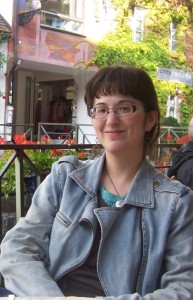 Andrea Felber Seligman is an African history PhD candidate and instructor. She lives in Chicago, Illinois, and has been an AHA member since 2007.
Andrea Felber Seligman is an African history PhD candidate and instructor. She lives in Chicago, Illinois, and has been an AHA member since 2007.
Current school: Northwestern University
Fields of interest: African and world history, comparative trade history, urban Africa, African art, and non-documentary research methodologies
When did you first develop an interest in history?
I developed a passion for history quite young when I was in middle school. I remember being inspired by a combination of family stories and anecdotes about places we’d visit as a family. My love of reading historical fiction stories at that age also certainly contributed. In high school, I was very fortunate to have several history teachers who went out of their way to encourage my interest. I remain incredibly grateful to Mr. Harned for letting me take independent study courses with him, Dr. Rogers-Beard for teaching me in the school’s newly introduced AP World History course and African history elective, and last, but far from least, to my freshman year history teacher, Mrs. Van Hoven, for giving me my first African history assignment.
What projects are you working on currently?
I am preparing my dissertation for defense on early East African trade history. I examine how inland small-scale communities of East Africans chose to interact with varied African and Indian Ocean world trading systems, from the start of the first millennium through the 1600s. I use historical linguistics to reveal the varied trade choices of these inland communities by following trade goods through the geographic distributions of words for different commodities in this region. I am also very interested in the different types of resource specialties that developed—whether for hunting, ironworking, or agriculture. We can appreciate these by recovering the historic vocabulary inventions of these communities. Altogether, taking this close look at early precolonial interior African history adds a complex picture of how this part of mainland Africa interacted with wider African and Indian Ocean networks of trade. It complicates past attempts to generalize about the African mainland’s role and highlights the agency of these non-urban, small-scale African communities in broader economic networks.
Is there an article, book, movie, blog, etc. that you could recommend to fellow AHA members?
Because of my dissertation’s emphasis on the importance of natural resources, including foods (whether hunted or cultivated), I have become quite interested in comparative histories of regional and global food circulations. Recently, I really enjoyed reading Candice Goucher’s Congotay! Congotay! A Global History of Caribbean Food (M.E. Sharpe, 2014). I found it fascinating how close attention to one sometimes overlooked theme—Caribbean cuisine—provided a key window into many different periods of Caribbean, Atlantic, and slave histories. Such a story also helped highlight the agency of slaves, ex-slaves, and other allegedly marginal participants of the era. I think this is a book many fellow AHA members as well as their students would enjoy.
What do you value most about the history profession?
I truly love the chance to learn about different ways of living, thinking, and acting that are found in the past. I equally relish the challenge of finding creative ways to learn about the past of people and regions less accessible through conventional historical sources.
Why did you join the AHA?
I wanted to be part of an organization that brought together historians and related specialists from all avenues of the profession—from independent scholars, grade-school teachers to university professors, public intellectuals, and many others. I find making connections across this breadth of interests an exciting and worthwhile goal.
Do you have a favorite AHA annual meeting anecdote you would like to share?
I personally love the informal mingling that happens at the book sale. One of my favorite such moments was when I was chatting with a publisher on how much I looked forward to reading a scholar’s new book when she mentioned that the author in question was right behind me! I turned around, introduced myself, and ended up having a great conversation.
Other than history, what are you passionate about?
I’m passionate about getting outside and enjoying beautiful nature. I do my best to bring it indoors with me as well with my hobbies of nature photography and container gardening.
AHA members are involved in all fields of history, with wide-ranging specializations, interests, and areas of employment. To recognize our talented and eclectic membership, AHA Today features a regular AHA Member Spotlight series.
This post first appeared on AHA Today.
This work is licensed under a Creative Commons Attribution-NonCommercial-NoDerivatives 4.0 International License. Attribution must provide author name, article title, Perspectives on History, date of publication, and a link to this page. This license applies only to the article, not to text or images used here by permission.
